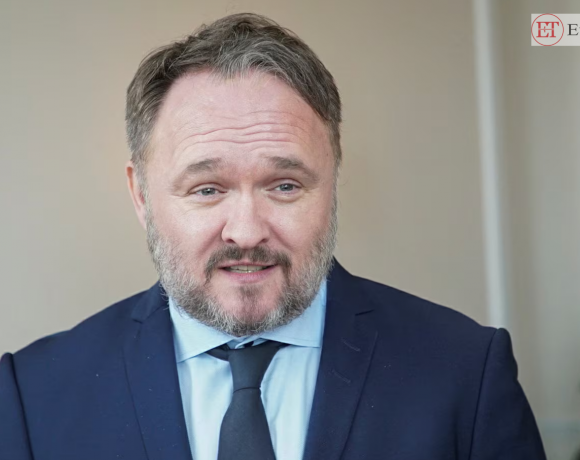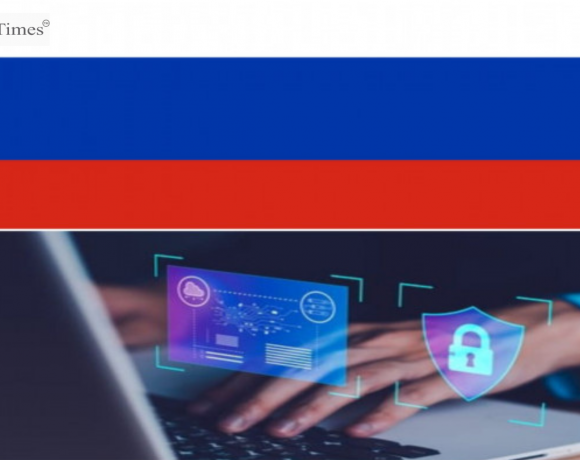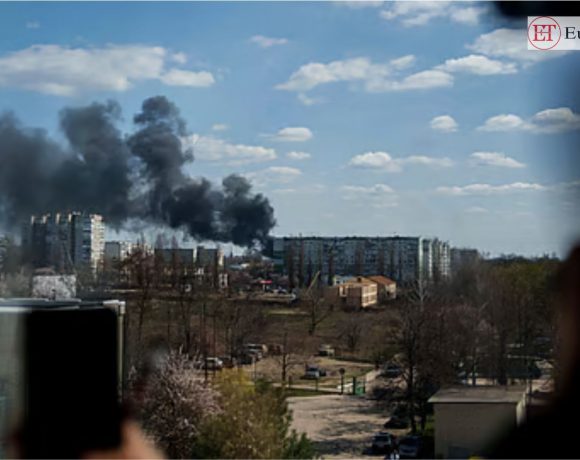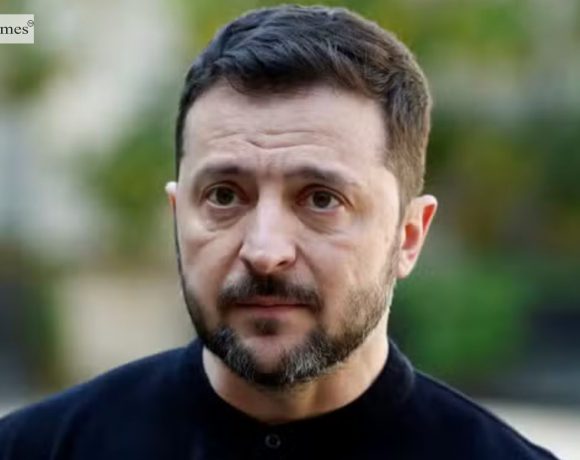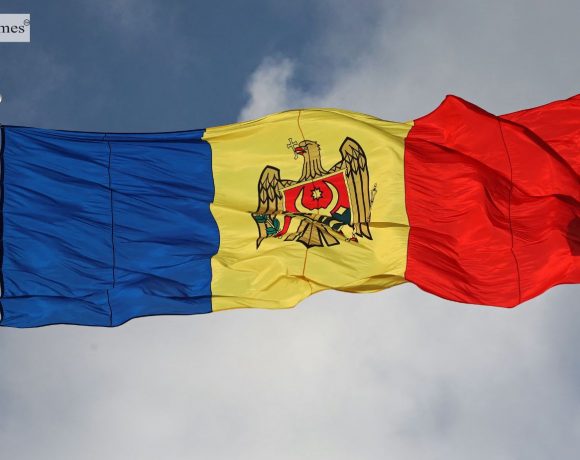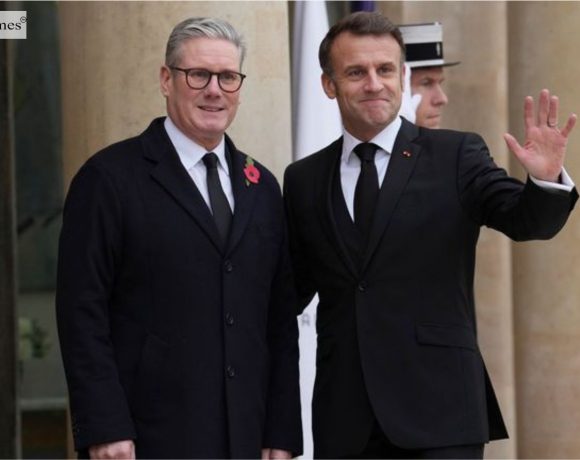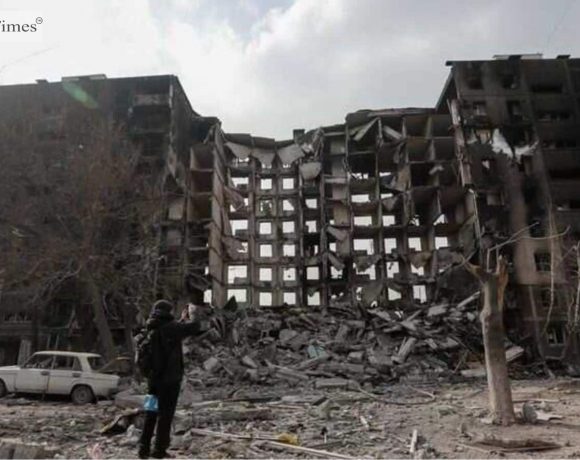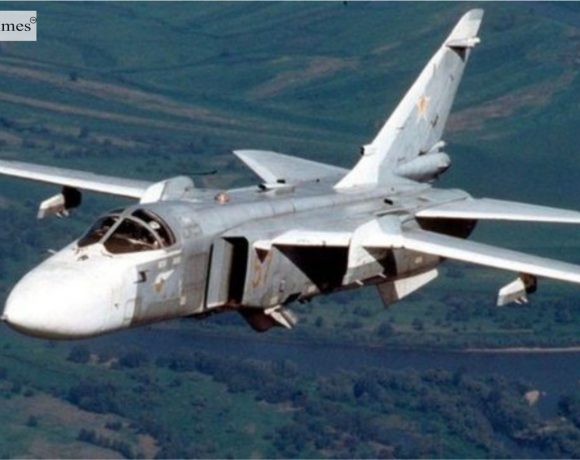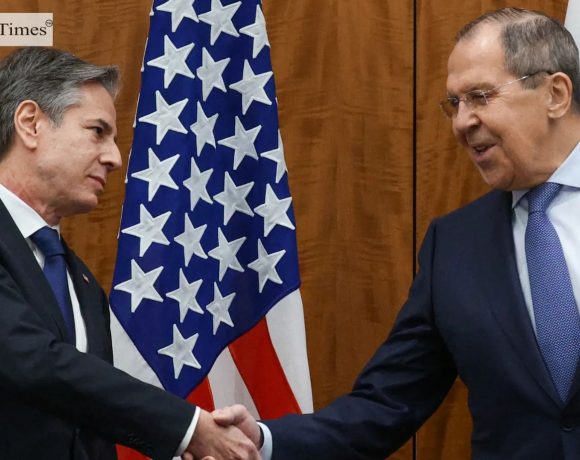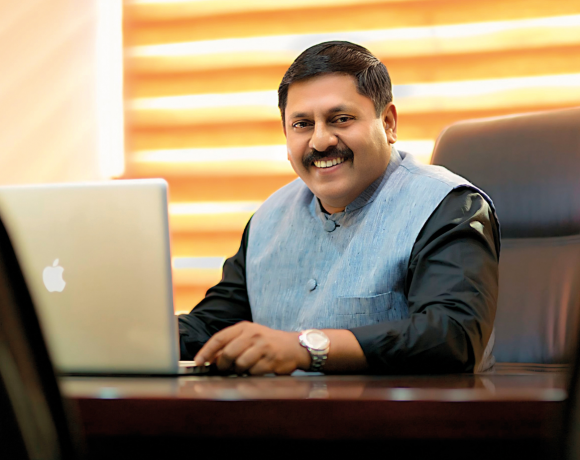
In a world where industry leaders abound, few dare to break the mould and forge entirely new paths. Sir Sohan Roy SK is one such trailblazer — a visionary who embarked on his journey from the coastal shores of Kerala, guided solely by an unwavering vision and the precision of an engineer. What followed was not just a story of success, but a revolution in global leadership. Known as the Efficient Knight, Sir Sohan Roy defied conventional norms, broke through cultural boundaries, and redefined what it means to innovate and lead. Featured consistently in Forbes’ list of Top Indian Leaders in the Arab World from 2015 to 2019, he is a celebrated entrepreneur, world record-holding poet, Hollywood filmmaker, educator, mentor, and a member of the IEMMY. As the founder of the International Maritime Club, World Medical Council, and the prestigious Indywood Billionaires Club (IBC), his impact spans across industries. In recognition of his pioneering work in humanitarian and environmental causes through business and cinema, he was awarded Knighthood by the ancient Italian chivalric order, Ordis Parte Guelfa — the first Indian to receive this honour.
The Beginning of an Amazing Voyage
Starting his professional journey as a marine engineer, Roy established Aries Marine in 1998. His innovative approach to business coupled with his commitment to excellence fueled the remarkable growth of the enterprise over the years. Headquartered in Sharjah, UAE, the firm now encompasses 76 companies across 30 countries, providing employment to over 3,000 individuals. Aries Marine & Eng Services LLC (AMES), the flagship brand of Aries Group, is the largest ship design and consultancy firm globally, catering to the maritime and design industry. It is supported by its Inspection & Maintenance (I&M) division, which operates the world’s largest NDT services with world-class testing facilities developed over decades of expertise, positioning Aries as a leader in the Middle East. Aries is ranked No. 1 globally in five fields and No. 1 in the Middle East in 31 segments. The company leverages cutting-edge technology that aids the committed team of engineers and technicians, to cater to a wide range of needs in the maritime industry through its various specialised divisions.
Sailing Ahead
Roy’s innovative spirit in maritime engineering has repeatedly made waves across the industry. His masterpiece, the Aries Punnamada Chundan, captured the world’s imagination as it sailed into the Guinness Book of World Records as the longest snake boat ever created. But this was just the beginning of his revolutionary designs. The ‘BOTEL,’ an ingenious semi-solar powered unsinkable seagoing steel houseboat, demonstrated his early commitment to sustainable maritime solutions. His creative mind didn’t stop there – the innovative ‘Topless Ship’ design and the groundbreaking ‘Solar AC Bed’ further showcased his ability to merge eco-consciousness with practical innovation. But his most profound impact on the maritime industry came through an ambitious global initiative: the transformation of over 4000+ vessels into ‘Green Ships.’ This monumental achievement not only set a world record but also sparked a revolution in sustainable shipping practices. At the core of Aries Group lies his transformative ‘Green Vision’ – an extraordinary step of dedicating a quarter of its total workforce hours specifically to ‘green’ initiatives.
His company is at the vanguard of maritime innovation, pioneering advances in energy efficiency, exploring cutting-edge alternate propulsion systems, and leading the charge in developing low and zero-carbon fuel technologies. What sets this vision apart is his commitment to progress over profit – the group regularly undertakes pilot projects and concept studies on a zero-profit basis, prioritising environmental impact over financial gain.
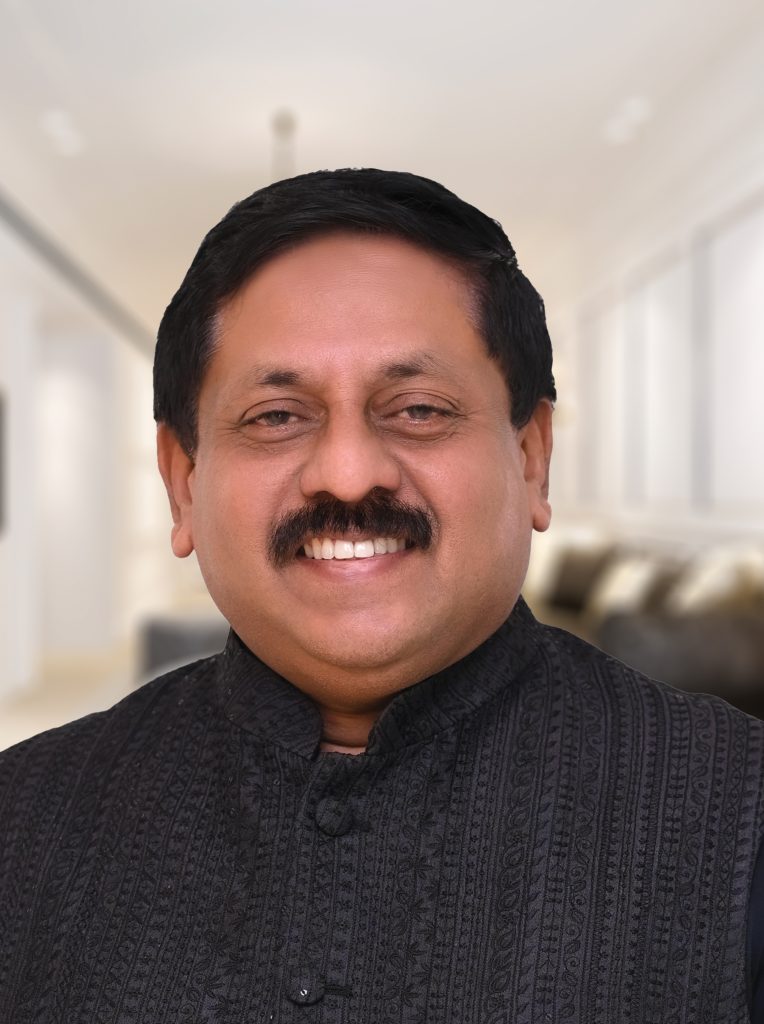
Tryst with Celluloid
Roy began to be noticed in the entertainment world after he directed “DAM999” which made history as India’s first mainstream Oscar-qualified movie. But his vision for cinema extends far beyond personal achievement. Over the past decade, he has emerged as a pivotal figure in bridging Indian cinema with global recognition, guiding 47+ Indian feature films and documentaries to the prestigious Academy Awards (Oscars). His ambitious US$10 billion, Project Indywood proved to be a turning point for the entire Indian Film Industry. Under Roy’s leadership, a series of groundbreaking facilities emerged: Aries Plex, India’s first dual 4K projection theatre, and Aries Vismayas Max, Kerala’s pioneering ATMOS sound mixing studio, and the country’s first integrated dubbing system. He also launched the first International Film Magazine dedicated to coverage of the Oscars, Cannes, and American Film Market, creating new pathways for Indian cinema’s global presence. The crown jewel of his initiatives, the Indywood Film Carnival, emerged as an unprecedented convergence of cinema, media, music, advertising, fashion, and education, drawing billionaire investors from diverse industries, all united by the vision of transforming Indian cinema.
As the founder of the Indywood Billionaires Club, Roy’s ambitions reach beyond entertainment to economic transformation, working toward the audacious goal of achieving parity between the Indian Rupee and the US Dollar. Through two decades of organising talent hunts, he has discovered and launched hundreds of promising careers in the film industry. He initiated establishment of Film Clubs across educational institutions and corporate organisations, fostering skill development and career design in unprecedented ways. He also pioneered an innovative approach to corporate social responsibility by leveraging the power of cinema for social change. Under his leadership, Aries Group broke new ground with ‘Jalam’, their first charity movie from south India, whose profits directly supported landless communities in Kerala’s Idukki region and funded women empowerment programmes. This successful model inspired further ventures, including ‘Aickarakkonathe Bhishaguranmaar’, ‘Mmmm – Sound of Pain’, ‘Aadhivaasi’, and ‘Karnika’. Each film emphasises his vision of using cinema not just as entertainment, but as a catalyst for meaningful social transformation.
Transforming Maritime Studies
Education holds a special place in Roy’s vision for the future. In 2012, he founded the Aries International Maritime Research Institute (AIMRI) to revolutionise maritime education through visual media and technology. The institute delivers advanced technical, management, and personal development courses for the maritime sector, and is pioneering AI-driven education through its i-Metaverse University initiative. He also initiated the Industrial Doctorate concept under AIMRI to bridge academia and industry and honor individuals who have made exceptional contributions or achieved remarkable lifetime accomplishments in their fields of expertise. He further revolutionised maritime education by creating Marine BizTV & Medi BizTV, the world’s first maritime TV channels, offering an impressive 20,000 hours of technical content. Roy’s innovative spirit has yielded 270 groundbreaking concepts and products, each designed with sustainability at its core.
Nurturing Young Talents
His vision has now expanded with the creation of the Indywood Talent Club, a platform that combines visual learning with personalised career guidance. Through its flagship Aries Kids Career Design Programme, he mentors students to map out their future careers based on their interests and abilities. The programme equips young students with the practical knowledge, skills, and insights essential for a successful transition into the professional realm. He recently took over India’s largest stage drama, Aries Kalanilayam, for a project dedicated to nurturing and showcasing young and talented individuals in the vibrant world of theatre production.
To enhance the learning experience, he also introduced the Educational 3D Theatre, creating an immersive environment where students can engage with educational content firsthand. Equipped with advanced features to facilitate seminars, video presentations, conferences, online classes, 3D i-education, animatic content, and more, this technological marvel helps schools, professional colleges, and universities keep pace with the growing needs of the education sector. At Agali Vocational Higher Secondary School in Kerala’s Attapadi, students now benefit from a state-of-the-art Educational Theatre and Film Club. The theatre features premium audiovisual technology, transforming everyday lectures and seminars into immersive learning experiences. Complementing this facility, the newly established film club introduces students to the art and craft of cinema, deepening their understanding of filmmaking.
The Quest to Optimise Efficiency
At the heart of Roy’s success lies his pioneering Efficiency Improvement System Management (EFFISM), a revolutionary efficiency improvement concept, which incorporates 100 critical efficiency parameters to optimise an individual’s both personal and professional performance. Coupled with the Hartoise programme, EFFISM has now become a blueprint for organisational excellence. Based on the basic principle of balanced body, mind, and Karma (1:1:1), it is the first validated Industrial Research Product developed by Aries International Maritime Research Institute (AIMRI). EFFISM allows individuals to maintain a perfect work-life balance and achieve their goals effortlessly. It not only understands an individual’s efficiency, but also changes their fundamental character and improves it daily. It identifies efficiency drain holes through its 200 set parameters and helps increase the profits of an organisation by up to 30 – 300% through efficiency improvement. Through various initiatives within the Aries Group, he has implemented continuous industrial education programs that bridge the gap between academic knowledge and practical industry requirements.
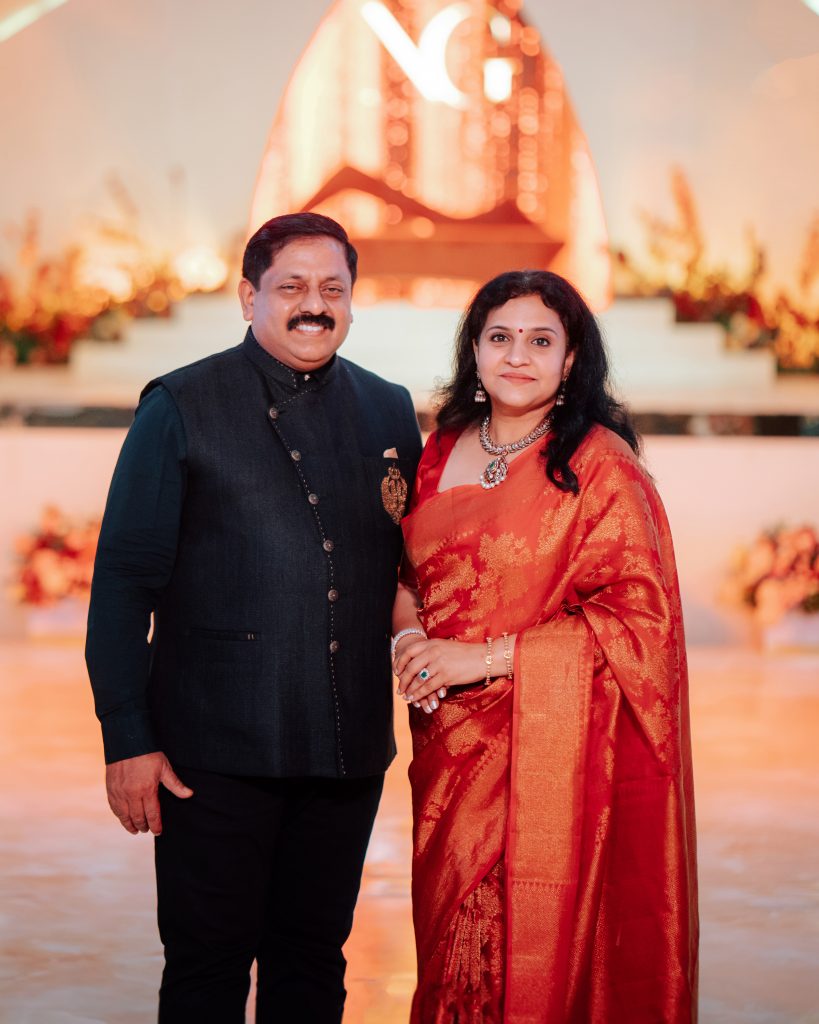
In Love with the Gentleman’s Game
Beyond the boardroom, Roy is a passionate cricket lover which led to significant investments in the sports sector. When he established the Aries Group of Companies, he brought his childhood passion into the corporate world. Every year, the company organises internal cricket matches, a tradition that not only keeps employees fit and healthy but also fosters team spirit and leadership skills. Taking one step further, Aries under his leadership started to conduct the Aries Premier Cricket League where corporates in the Middle East come together and share their love for the sport. As his cricket journey continued to expand internationally, he became a co-owner of the Harare Hurricanes in Zimbabwe’s Zim Afro T10 cricket league, partnering with Bollywood actor Sanjay Dutt. This venture further demonstrated his commitment to promoting cricket and creating opportunities for talent development across different countries. His dream of owning a cricket team in Kerala became a reality when the Kerala Cricket League (KCL) was announced. He seized the opportunity to acquire Aries Kollam Sailors, which went on to win the first match of the season- a moment of triumph that validated his long-standing love for the Gentleman’s Game.
Besides his entrepreneurial achievements, his literary achievements are equally impressive. He holds the Time Record and World Book of Records UK recognition for writing and publishing socially relevant short poems. In the last seven years, he has written over 2,700 poems without taking a single day break. His work in Anukavyam represents a unique blend of social consciousness and artistic expression, reaching over 200,000 followers through daily poetry posts.
Taking HR Management to New Heights
What sets the Aries Group apart is its revolutionary human resource practices. Numerous model schemes have been initiated as part of its policy programmes, including providing pensions to employees ‘homemakers’ partners and parents, providing employees with a 50% share, royalties, providing financial security to their parents in the event of an employee’s unexpected demise, providing educational allowances, scholarships for their children’s education and more. Roy’s employee-centric philosophy manifests in unique initiatives such as grandparent care support, interest-free home support, extended maternity and motherhood leave, menstrual leave, startup partnerships, anti-caste and anti-dowry commitment, and allowance for inter-caste marriage to name a few. These measures are a testament to the organisation’s commitment to creating a workplace where employees and their families can thrive and prosper.
These groundbreaking practices have not only fostered loyalty but have also created a model for sustainable business growth. He also established Happiness Department in his organisation to oversee their new fitness centre, employee engagement programmes, wellness initiatives, and even fitness challenges. The department also conducts regular health check-up drives, and team-building activities to promote a balanced, happy workplace. Recognised with prestigious accolades such as the Visionary leadership in Maritime Innovation and Cinema at the Global Indian Business Achievement Awards, Pride of Bharat Award 2024 by the I CAN Foundation India, Maritime Personality of the Year Award 2023 and the Global Peace Award at the Global Summit 2022, Roy’s dynamic leadership and visionary ideas have left a profound mark on various industries.
Back to the Roots
As his global success grew, Sohan Roy’s thoughts frequently returned to Aickarakkonam, the village that shaped his early years. Despite building an international maritime empire, he maintained a deep connection to his roots. Recognising the untapped potential in Aickarakkonam, he envisioned creating meaningful opportunities for its residents. His goal extended beyond job creation. Instead, he aimed at empowering individuals, especially women, toward financial independence and personal growth. By establishing an Aries Group office in Aickarakkonam, he bridged his professional achievements with his commitment to community development.
A cornerstone of Roy’s vision for Aickarakkonam was implementing skill development programs for women. Understanding the barriers many women faced in accessing education and employment, he introduced training initiatives that equipped them with practical skills. These efforts fostered independence and confidence, breaking traditional constraints that had historically limited their opportunities. Through workshops, classes, and support systems, villagers have now gained tools to build sustainable futures. To brand Aickarakkonam and Ayurveda globally, he produced ‘Aickarakonnathe Bhishaguranmaar’ which contended for the Oscars in 2023, and created a global awareness about Ayurvedic practitioners worldwide.
Despite leading a global organisation, Roy maintains a personal involvement in Aickarakkonam’s development. For him, developing his native place represents more than corporate social responsibility – it’s a deeply personal mission to honour his origins and the values that shaped him. Through his efforts to transform Aickarakkonam into a model village, he ensures that the community spirit that influenced his character continues to thrive and inspire future generations.
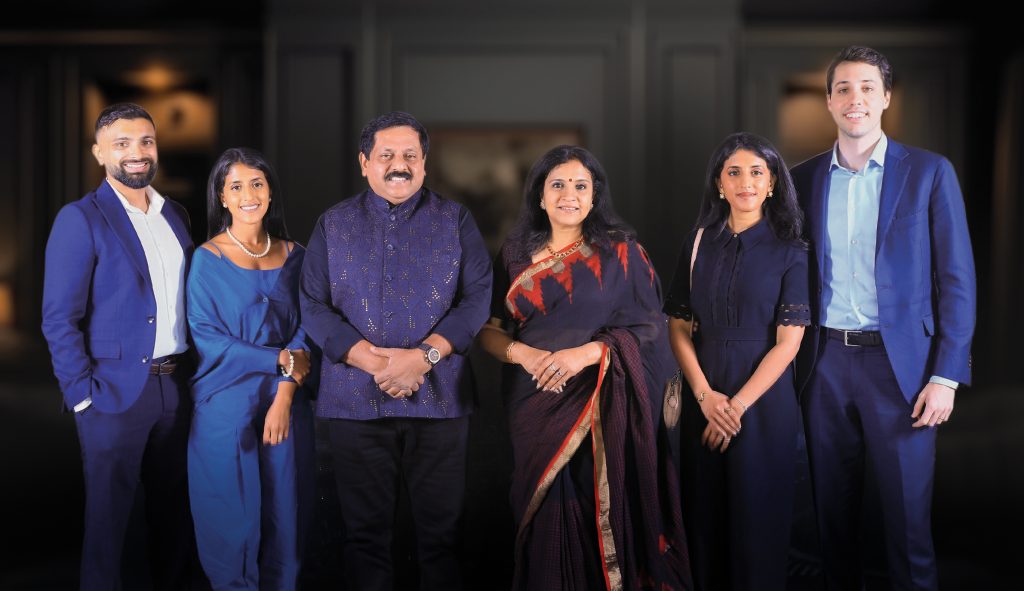
Family Matters
Family plays a crucial role in Roy’s story. His wife, Abhini, a talented classical dancer and interior designer, has been his pillar of support throughout his journey. Their daughters, Nirmalya and Nivedya Sohan Roy, have followed in their father’s footsteps as Professional Naval Architects, ensuring the continuation of his legacy while bringing fresh perspectives to the business. Abhini is the Managing Director of Aries International Interiors – Dubai, Aries Telecasting Pvt Ltd; Producer at BizTv Network, Executive Director of Indywood Fashion Premier League (IFPL) and promoter of Khadi handlooms through her brand ‘Abhini Contours.’ Nirmalya is the Vice President of Aries Group, looking after the group activities. She made waves by becoming the first-ever female president of Ship Science at the University of Southampton. As a maritime industry leader, she is actively focused on driving change in the industry. Her husband, Gilberto is a naval architect working in a leading maritime firm in the UK. Dr. Nivedya is the Managing Director of Aries Dental & Aesthetics Clinic, Dubai and Co-founder of AM Healthhub, Dubai. A Clinical hypnotherapist, Graphologist, and Trainer, she specializes in subconscious rewiring for emotional healing and transformation. Her fiancé, Dr. Neil Shah is an expert mathematician and financial advisor, who recently founded an AI and automation company in the UAE.
A Rewarding Journey
Sir Sohan Roy’s story is not just about personal achievement; it’s about creating lasting impact across multiple domains while maintaining a strong commitment to social responsibility and innovation. His journey from a naval architect to a global leader in business, entertainment, and social development offers invaluable lessons for aspiring leaders in today’s interconnected world.
As he continues to break new ground in various fields, his legacy grows stronger. His integrated approach to business, creativity, and social responsibility provides an inspiring template for modern leaders seeking to make a meaningful impact in an increasingly complex global environment. Roy reminds us that true leadership transcends individual success to encompass the broader goal of societal development.
Pic Courtesy: Pegasus Photography

